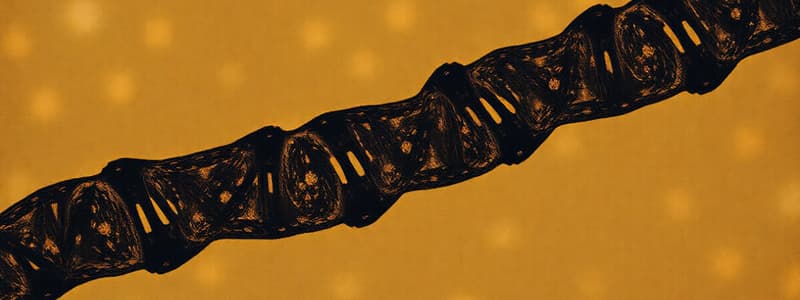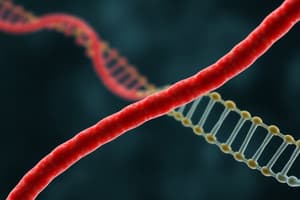Podcast
Questions and Answers
Which component is essential for the formation of the transcription complex in eukaryotic cells?
Which component is essential for the formation of the transcription complex in eukaryotic cells?
- Single-stranded RNA
- Several proteins and RNA polymerase II (correct)
- DNA helicase
- Only RNA polymerase I
What is the role of the methyl guanosine residue added during RNA processing?
What is the role of the methyl guanosine residue added during RNA processing?
- It enhances the transcription initiation rate.
- It protects RNA from degradation and aids ribosome binding. (correct)
- It facilitates cleavage of the RNA transcript.
- It assists in the removal of introns.
What defines the regulatory regions of an mRNA producing gene?
What defines the regulatory regions of an mRNA producing gene?
- They constitute the coding sequences only.
- They are composed exclusively of exons.
- They include sequences that ensure basal expression and those where expression is regulated. (correct)
- They are solely responsible for the final mRNA structure.
Which of the following best describes the function of the spliceosome during mRNA processing?
Which of the following best describes the function of the spliceosome during mRNA processing?
What signal is recognized by an endonuclease during the addition of the poly(A) tail?
What signal is recognized by an endonuclease during the addition of the poly(A) tail?
What is the primary function of transcription in gene expression?
What is the primary function of transcription in gene expression?
Which sequence is commonly found in promoter regions of eukaryotic genes?
Which sequence is commonly found in promoter regions of eukaryotic genes?
What is the role of transcription factors in transcription?
What is the role of transcription factors in transcription?
What characterizes the primary RNA transcript before processing?
What characterizes the primary RNA transcript before processing?
What are the untranslated regions (UTR) of mRNA important for?
What are the untranslated regions (UTR) of mRNA important for?
Which sequences are crucial for splicing introns from the primary RNA transcript?
Which sequences are crucial for splicing introns from the primary RNA transcript?
In which cellular compartment does RNA synthesis occur?
In which cellular compartment does RNA synthesis occur?
What does gene expression regulation depend on?
What does gene expression regulation depend on?
Flashcards
RNA Polymerases in Eukaryotes
RNA Polymerases in Eukaryotes
Eukaryotic cells have multiple RNA polymerases, each responsible for transcribing different types of RNA.
Preinitiation Complex
Preinitiation Complex
A group of proteins that bind to a gene's regulatory region, accurately positioning RNA polymerase for transcription initiation.
Regulatory Regions of Genes
Regulatory Regions of Genes
Regions within a gene that control its expression levels. These include sequences for basal expression and regulated expression.
Intron Removal
Intron Removal
Signup and view all the flashcards
Spliceosome
Spliceosome
Signup and view all the flashcards
Gene Expression
Gene Expression
Signup and view all the flashcards
Transcription
Transcription
Signup and view all the flashcards
Messenger RNA (mRNA)
Messenger RNA (mRNA)
Signup and view all the flashcards
Promoter
Promoter
Signup and view all the flashcards
TATA Box
TATA Box
Signup and view all the flashcards
Primary RNA Transcript
Primary RNA Transcript
Signup and view all the flashcards
Intron
Intron
Signup and view all the flashcards
Exon
Exon
Signup and view all the flashcards
Study Notes
Transcription Overview
- Transcription is the DNA-directed synthesis of RNA
- Gene expression begins with transcription
- To produce mRNA, a gene sequence on DNA and the exact start site are needed
Gene Structure
- Typically, each gene contains two types of information:
- Specifies the primary structure of the final product
- Critical for gene product expression regulation.
- Genes are composed of:
- Coding exons
- Non-coding introns
- Non-coding consensus sequences (promoters and splice sites)
Promoters
- DNA sequences that determine the start site of RNA synthesis.
- Often contain a "TATA box" sequence located 15-30 base pairs upstream of the transcription start site.
- Other sequences, like CAAT and GC boxes, are also important for promoter function.
- In eukaryotes, transcription factors bind to the TATA box to facilitate RNA polymerase binding.
Splice Acceptor and Donor Sequences
- Consensus sequences at the 5' and 3' ends of introns
- Introns often begin with GU and end with AG, preceded by a pyrimidine-rich tract.
- Sequences are crucial for intron removal during RNA processing.
Features of Transcription
- Selective: Only specific parts of the genome are transcribed at any given time and cell.
- Primary RNA transcripts are modified
RNA Synthesis
- Occurs in the nucleus
- Catalyzed by RNA polymerase
- Protein-coding genes produce mRNA as an intermediate.
- Regulatory mRNA sequences (in the 5' and 3' UTRs) affect stability and translation efficiency.
- The initial mRNA is then processed/edited.
Transcription Complex Formation
- RNA polymerases: Several exist in eukaryotic cells.
- Pre-initiation complex formation: Proteins bind to the gene to be transcribed.
- This complex positions RNA polymerase on DNA.
- Regulatory regions: mRNA-producing genes can be divided into coding and regulatory regions. Regulatory regions include those for basal expression and where expression is regulated
- Basal transcription complex formation requires transcription factors.
- A single-stranded RNA is produced from double-stranded DNA.
Newly Synthesized RNA
- Complementary to the DNA template strand.
RNA Processing
- Gene transcription yields RNA that's larger than the cytoplasm's mRNA for translation.
- Primary transcript contains transcribed intron segments.
- Introns are removed, and exons are joined to form mature mRNA.
- mRNA is "capped" (methyl guanosine cap) at the 5' end and contains a polyadenine tail at the 3' end.
Intron Removal
- Splice sites within the gene define introns.
- Spliceosomes convert primary transcripts into mRNA.
- Spliceosomes are made of the primary transcript, small nuclear RNAs (snRNAs), and > 50 proteins (snRNPs).
- Mature RNA leaves the nucleus through nuclear pores and enters the cytoplasm.
Alternative Splicing
- Genes can create multiple proteins by joining different exon segments in the primary transcript.
- Cell-specific regulation may explain why the human genome has fewer genes than anticipated.
Rifampin
- Inactivates prokaryotic RNA by binding to RNA polymerase and altering its conformation, preventing RNA synthesis.
- Eukaryotic RNA polymerase isn't affected by rifampin.
Mutations and Disease
- Mutations in splice sites, the TATA box, or intron-exon boundaries can cause diseases like thalassemias.
- Thalassemias are hereditary anemias characterized by decreased hemoglobin production due to mutations affecting globin gene synthesis.
Studying That Suits You
Use AI to generate personalized quizzes and flashcards to suit your learning preferences.




